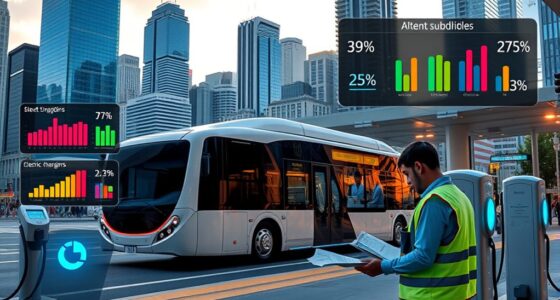Classic VW buses often qualify as historic vehicles in the US and EU, making you eligible for certain exemptions. If your bus is at least 25 years old and mainly used for exhibitions or club events, you may benefit from reduced registration fees, limited inspections, or emissions exemptions. However, laws vary by location, so it’s important to verify your area’s specific rules. Understanding these details can help you navigate the benefits and requirements for your vintage VW bus effectively.
Key Takeaways
- Classic VW buses over 25 years old can qualify as historic vehicles, making them eligible for certain exemptions.
- Exemptions often include reduced registration fees and relaxed emissions testing, depending on jurisdiction.
- Laws vary between the US and EU, with specific criteria for vehicle use, preservation, and documentation.
- Restoring and maintaining authenticity can help secure and retain historic vehicle status and exemptions.
- Owners should verify local regulations and keep detailed records to ensure legal operation and benefit eligibility.

Have you ever wondered what rules apply to owning and operating a historic vehicle? If you’re considering a classic VW bus, it’s important to understand the specific laws that govern such vehicles in the US and EU. These regulations often include exemptions or special provisions that can make owning a vintage vehicle more manageable, but they also come with certain requirements you need to be aware of. One key aspect is how these laws treat restoration costs and emission standards, which can considerably impact your experience.
In many regions, historic vehicle laws are designed to preserve the cultural and historical significance of classic cars, including iconic models like VW buses. To qualify, your vehicle typically needs to meet certain age criteria—often 25 years or older—and be used primarily for exhibition, club activities, or occasional driving. Once classified as a historic vehicle, you might benefit from reduced registration fees, limited inspection requirements, or even exemptions from some emissions standards, depending on the jurisdiction. However, these exemptions aren’t always straightforward. For example, in the US, some states allow historic vehicles to be exempt from regular emissions testing if they are used sparingly or are kept in a museum setting. But, the specifics vary widely by state, so it’s vital to check local laws.
Regarding restoration costs, owning a vintage VW bus can be both rewarding and costly. Laws that provide exemptions from strict emissions standards can help lower the ongoing costs of keeping your vehicle legal on the road. Still, the initial restoration can be expensive, especially if your bus needs a full overhaul to meet safety and appearance standards. Many owners find that restoring a vintage VW bus involves sourcing period-correct parts, which can be rare and pricey. While some jurisdictions may relax emission standards for historic vehicles, the quality of the restoration often determines how well your bus performs and complies with regulations. If your vehicle isn’t up to current emission standards, you might need to install emission-reducing modifications or keep detailed records proving its status as a historic vehicle to maintain exemptions.
Frequently Asked Questions
Can I Modify a Classic VW Bus Without Losing Its Exemption Status?
You can modify your classic VW bus without losing its exemption status if you follow the proper restoration guidelines. Keep modifications within the accepted standards to preserve its historic classification, which can help maintain resale value. Avoid extensive changes that alter its original appearance or mechanics. Staying compliant guarantees you enjoy the benefits of exemption, while also protecting your bus’s value and authenticity for future resale.
How Often Do I Need to Renew My Historic Vehicle Registration?
They say, “A stitch in time saves nine,” and that’s true for your vintage restoration. You typically need to renew your historic vehicle registration annually or biennially, depending on your state or country. Staying active with collector clubs can keep you informed of renewal deadlines. Regular renewals help preserve your exemption status, ensuring your classic VW bus remains a proud part of your collection, ready for any adventure or show.
Are There Mileage Restrictions for Exempt VW Buses?
You might wonder if there are mileage limits for exempt VW buses. Typically, historic vehicle laws don’t impose strict mileage restrictions, but some regions could have limits to maintain exemption status. Keep in mind, you still need to renew your registration regularly. Staying aware of mileage limits helps guarantee your VW bus remains eligible for exemption, and timely registration renewal keeps your vehicle legally on the road.
Do Classic VW Buses Require Emissions Testing in the US or EU?
If you’re restoring a vintage VW bus, you might wonder about emissions testing. In the US, classic VW buses often qualify for exemptions if they’re used for vintage restoration or show purposes, meaning they don’t require emissions compliance. In the EU, regulations vary, but many historic vehicles are also exempt from emissions testing. Always check local laws to verify your vehicle remains compliant and preserves its vintage status.
How Does Insurance for Historic VW Buses Differ From Regular Vehicles?
When insuring your historic VW bus, you often qualify for insurance discounts because it’s considered a collectible vehicle. These policies typically have relaxed policy requirements, focusing on limited annual mileage and storage conditions. Compared to regular vehicle insurance, you’ll benefit from lower premiums and specialized coverage, but you must meet specific criteria for eligibility. Always check with insurers to confirm your classic bus qualifies for these benefits and meets all policy requirements.
Conclusion
Knowing whether your classic VW bus qualifies as a historic vehicle can save you time and legal trouble. Remarkably, over 20% of registered vehicles in the US are now classified as historic, reflecting a growing appreciation for vintage cars. By understanding the specific laws in your region, you can enjoy your classic bus legally and safely. So, stay informed, keep your vehicle well-maintained, and celebrate your piece of automotive history with confidence.









